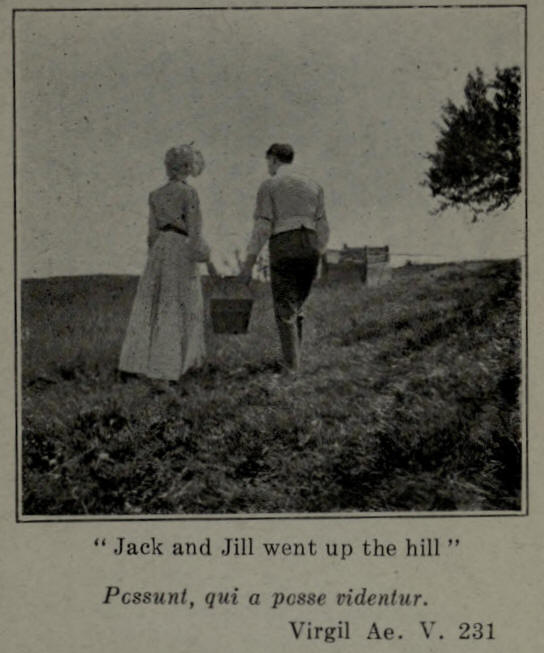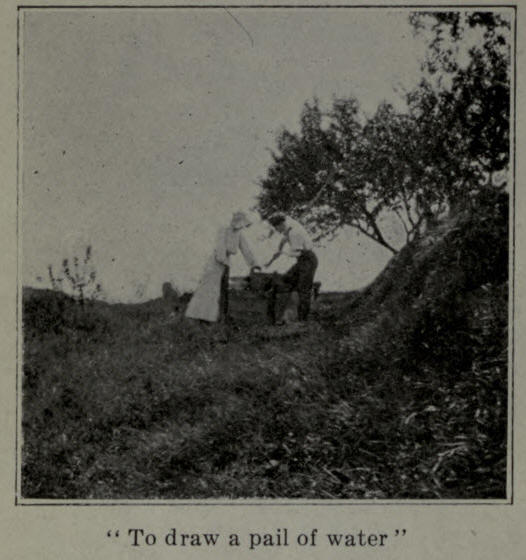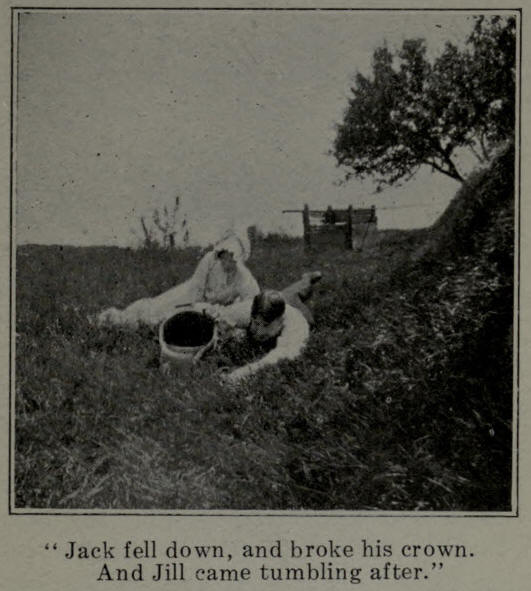
MANY things are better than they appear
at first sight. Have you not found it so? Even a hen finds it pays
to scratch and look beneath the surface. Often she gets a worm for
her pains,—and sometimes a kernel of corn. You will see this
exemplified in many of the old nursery stories such as "Jack and the
Bean Stalk," "Little Jack Horner," "Jack the Giant Killer," and the
subject before us—"Jack and Jill." We all remember the fun we got
out of them in our younger days. We then thought that there was
nothing in them but nonsense. Look farther down into the heart of
them and see if you do not find richer treasure.
Did you ever notice
that every one of these heroes is a Jack. Look up this word in an
unabridged dictionary, such as The Century, which I hope you have,
and note how many useful things are called Jack something, as
jack-knife, jack-plane, jack-screw, jack-smith, boot-jack, and
scores of others. Note that they are all made for doing things—for
important service. The world could not get along without them. From
its associated content the word jack would suit as well for a
patriot's motto as the historic Ich Dien in the Prince of Wales's
coat of arms. But I must not wander about in this fashion or I shall
never get there. I have set out to tell you, my reader, what I have
discovered in Jack and Jill—the poem I mean.
Nobody knows when
this poem was written, by whom, or where. Like the story of the
Noachian Deluge its variant tradition is almost world wide. It is
told in every civilized language, and it goes back beyond the dawn
of veritable history into the shadowy past where truth and fiction
are inextricably tangled together. In the Northlands the peasants
have a legend that a crusty old tyrant compelled the heroes that
figure in the poem to fetch water from a distant well until they
would have died from exhaustion had not the man in the moon snatched
them away to live with him. And to this day these simple minded
people believe, so it is said, that Jack and Jill may be seen on the
face of the moon.
I have called this
piece of early composition a poem. It is difficult to give a very
satisfactory definition of poetry, and I shall not now undertake the
task. Suffice it to say that some of its elements are rhythm, the
choice and arrangement of such words as are adapted to the awakening
of emotion, due recurrence of accented and unaccented syllables, and
often, though not always, combined with definitely measured lines
and rhyme or similarity of sound at the end of the lines. Of the
three great kinds of poetry, dramatic, epic and lyric, I do not
hesitate to place the poem "Jack and Jill" in the class epic, it
being in form of a narrative, the author telling the story in his
own words.
Yes, Jack and Jill is
a great epic. True, when measured by lines or by words, it falls far
behind others of its class; but in thought and style it transcends
them all. Allow your mind to dwell on the picture so vividly
portrayed by a few skilful touches, and idea is superadded to idea
until one is simply amazed at its content. So far reaching and ever
widening is the conception that the mind fairly loses itself in the
vast field spread out in panoramic distinctness and beauty. Its
magnitude consists rather in its implications than in multitude of
words;—in fact this marvellous economy of words is beyond compare
and adds greatly to the forcefulness of the thought. The famous
artist and author Ruskin well says,—"It is not always easy in
painting or in literature to determine where the influence of
language stops and where thought begins. The higher thoughts are
those which are least dependent on language. No weight, nor mass,
nor beauty of execution can outweigh one grain or fragment of
thought."
Now Jack and Jill are
wrought into a thing of beauty and power with the least possible
expenditure of effort and external show. The author knew what to
say, and he stopped when he was done. And so, whether one regards
the mechanical structure of the poem, the beauty of its style, its
easy flow as it glides smoothly along its limpid path, its rhythm,
pathos and tenderness, it simply challenges all competition.
Throughout, the poem is good Anglo Saxon, and with only three
exceptions every word is a monosyllable.
You will observe that
this poem divides itself into two distinct parts. The first part,
consisting of two lines, describes the ascent or going up of the
heroes, with the purpose of the action. This I shall designate The
Anabasis. The remaining two lines tell the story of the descent or
the Katabasis, I shall call it, that is the going down, with the
tragic ending.

The Anabasis
THE word Jack is
evidently derived from the Hebrew word Jacob rather than the Greek
Johannes, from which the English John is derived. The name was
probably a surname added to the original name of the hero to express
some incident or characteristic of his life history.
You will remember
that the Hebrew-Jacob means supplanter, and that it was given to the
patriarch because of the fraud he practised on his brother Esau.
This gives a certain tenability to the idea that the name was given
to our hero on account of some strategy by which he had got the
better of a rival in winning the affections of the fair one with
whom he is here associated. To my mind the more probable idea is
that the name was given to him on account of his resemblance to the
Hebrew patriarch in another prominent feature of character. It is to
be noted that Jacob of Scripture record was a man of affairs,
eminent as a doer of things. This gives to the name a fine fitness
for the man of exploits described in the poem, and it also
harmonizes with the application of the name Jack to so many
appliances or instruments in economic service spoken of on a
preceding page.
The name Jill, as was
befitting, is of very different type. Mark the softness and delicacy
of its note—the limpid smoothness with which it flows from the lips.
Well matched pair were these, "He for manly vigor formed; for
softness she, and, sweet attractive grace."
And now you will
please note that this was no play day or occasion for vain show, but
rather for arduous and persevering toil. Many there are who make
progress when wind and tide are in their favor, but, when hardship
and hazard assail them they turn back in helpless despondency,–nor
have they, in the vicissitudes of life's journey, reserve force or
ambition to help themselves. "Jack and Jill went up the hill." Nor
was it an aimless going that is here pictured. No, indeed; they went
"to draw a pail of water." Note the implication in this little word
draw. It was not to turn a tap or handle a pump. The old time
well-sweep with its crotch and pole rises in our mental
vision,;—more probably, indeed the hand pole with hook on the end—undesigned
but unmistakable evidence of the early origin of the poem.

The Katabasis
ALLOW me now to
hasten forward to the second part of our story—the Katabasis. Here
the author wastes no words i n the way of preparation for the
momentous scene he is about to introduce. There are no rhetorical
flourishes, such as—"If you have tears, prepare to shed them now."
The story moves on quietly and calmly without the least
foreshadowing of catastrophe. We are left to fill in for ourselves
the fact that the happy pair have gone on to the well, have filled
the pail with water, and are now returning, tripping down the
hillside on the homeward way. Suddenly the denouement! The great sad
event breaks in upon us like a peal of thunder from a clear sky.
With all the emphasis of explosion it comes. Nor does the writer use
effort to enforce the impression by comparison or figure of speech,
as you may often find even in Homer, the prince of poets, though he
was. To the intelligent reader there cannot fail to come suggestions
of resemblance and contrast. Especially there occurs the picture of
that other fall when "You and I and all of us fell down." But at the
moment what a medley of ideas present themselves to the mental
vision,—the humorous and the grave come up in quick succession. The
ludicrous holds sway for the moment as we see Jack plunging forward,
dragging after him Jill, his better half, who, holding on to the
pail, comes tumbling headlong over him, and the pair of them,
drenched with water, lying a shapeless heap along the hillside. But,
as one takes in the whole situation mirthfulness is soon checked
giving place to sadness and sympathy.
Just another thought
and I am done. In that other fall that I have referred to, it was
the weaker one who made the first misstep, and Adam, the strong man,
who came tumbling after. Indeed, does it not often occur when one is
on the very verge of success, some mishap or carelessness results in
failure? The wise may not glory in his wisdom nor the strong in his
strength. In the experience of life it is often the unexpected thing
that happens. |

